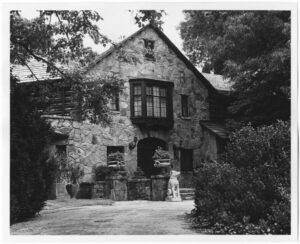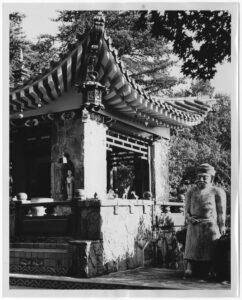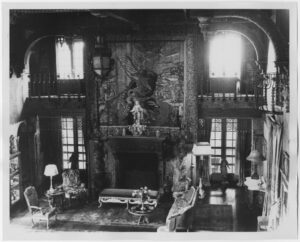Chinqua Penn Plantation, the sprawling historic mansion located in Reidsville, North Carolina, finally has a new owner and its fate is once again in question. The home and 23 acres of surrounding grounds were purchased by Mitchell Barnett Properties, LLC, for $650,000, quite a bit less than Sun Trust’s original asking price of $1,900,000. This is yet another twist in the story of this grand manor.
Built in 1925 by Thomas Jefferson “Jeff” Penn and his wife Margaret “Betsy” Schoellkoph Penn, the house was a treasure trove of architecture and decorative arts; a culmination of years of travel and collecting. Mr. Penn was a native of Reidsville and a descendant of both William Penn and Thomas Jefferson. Mrs. Penn was from an affluent New York family that helped harness power from Niagara Falls. The family pedigrees were buoyed by serious tobacco money. The management of tobacco interests in the East as well as three world tours gave the Penns an ideal platform from which to amass their extensive collection. To house these treasures, the Penns built a thirty-room mansion created from the stone that surrounded the land. It was decorated in an eclectic style with art and architecture from every corner of the world, including a full size stone and timber pagoda. They named the “plantation” Chinqua Penn, which was a combination of their family name and the chinquapin, a species of the American chestnut tree, which was indigenous to the area.
The Penns had always intended to give the plantation to the state of North Carolina and when Mr. Penn passed away in 1946, Mrs. Penn began to make plans for the estate. On October 20, 1959, she formally presented the home and grounds to the Consolidated University of North Carolina, which included the University of North Carolina at Chapel Hill, North Carolina State College (NC State), and Woman’s College (now UNCG). At the same time, she gave the university system more than $750,000 to maintain the home and its vast farmlands, orchards, lakes, forest, and livestock. Provisions in this gift stated that she be allowed the status of lifetime tenant, giving her full rights to the property until her death and that after twelve years, if the management of the estate became “unfeasible,” the university system could dispose of the property as they saw fit.
The university system initially saw Chinqua Penn as a top tourist destination and a research center. UNCG would manage the house and NC State would develop a beef cattle and crop research center and operate a 4-H Club camp by the 25 ½ acre lake. The home was also seen as a perfect location for North Carolina students to study art and interior design.
For twenty-five years after Mrs. Penn’s death in 1965, UNCG and NC State oversaw the operations of Chinqua Penn. Management and economic challenges faced by operating the estate, as well as over $2,000,000 in estimated repairs, forced the UNCG Board of Trustees to close the house to tours in 1991. A non-profit agency quickly formed in an attempt to keep the home open to the public, but “lack of funding, economic conditions, and debt” required them to give up the endeavor in 2002.
Chinqua Penn’s fortune seemed to change when in 2006, Calvin Phelps, a local businessman also involved in the tobacco industry, purchased the home and 23 acres of land from the university system for $4,100,000. He immediately opened it for tours and planned to expand the use of the property to include a winery, overnight lodging, corporate conferences, and weddings. NC State continued to retain the Penn 4-H Educational Center. By 2012, besieged by financial and legal troubles, Phelps was ordered by the United States Bankruptcy Court to sell Chinqua Penn’s art, artifacts, and furnishings during a two-day auction in Greensboro, North Carolina. The items sold for more than $3,000,000, which was funneled to his many creditors. Some of the objects were purchased by Lindley Butler on behalf of the Museum and Archives of Rockingham County. On September 18, 2013, Chinqua Penn went into foreclosure, with SunTrust Bank acquiring the property for $1,400,000.
The recent purchase has opened the door to new possibilities for the property. Although its portable treasures have been auctioned off, the home’s beautiful architecture and surrounding acreage continue to be a huge draw. As there has been no announcement of intended plans, Chinqua Penn’s future remains to be seen.
By Kathelene McCarty Smith




2 replies on “Another Twist of Fate for Chinqua Penn Plantation”
Thank you for this article.
I have such wonderful memories of visits to this property. My favorite things to see were the Chinese furniture and sculpture and the replica of what I believe was King Tut's chair. Hoping that someone will find it in their heart to take care of this beautiful place.